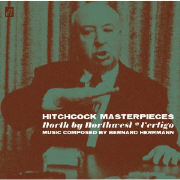- HOME
- SHOPPING
- Pre-Order (Upcoming)
- Pre-Order Imported
- Pre-Order Japanese
- New Releases
- New Imported
- New JPN Movie & TV
- New JPN Anime
- New JPN Game
- New Blu-ray/DVD/etc.
- Imported CDs
- Japanese Releases
- Japanese Movie & TV
- Foreign Movie & TV
- Anime
- Game
- Blu-ray/DVD/etc.
- Shopping Cart
- SPECIAL
- Feature Articles
- On Sale
- INFORMATION
- About Us
- Service Center
- News & Information
- Contact Us
- Mail News
- Japanese Site
- Close MENU
- HOME
- HITCHCOCK MASTERPIECES: NORTH BY NORTHWEST/ VARTIGO

In a sixty year career that began with hand-cranked cameras and silent movies stars, and ended with widescreen Technicolor and method actors, Alfred Hitchcock would taste both success and failure in pursuit of his goals.
Along the way, he would create a world as strange as his own personality. A Hitchcockian world, where glamour and thrills are stalked by fear and guilt. Vertigo and North by Northwest are the first two of an unbroken sequence of five modern masterpieces directed by Hitchcock between 1958 and 1964 (Psycho, The Birds and Marnie complete the quintet).
North by Northwest is a delightful chase comedy-thriller with a touch of sex that made such an impression on the producers of the first Bond film in the early Sixties, they tried to recreate the movie's substance and style in their own picture. Not only that, they even tried to hire Cary Grant for the part of 007 (Grant declined)
Derided, even forgotten, Vertigo is now regarded the masterwork of a great director at the very peak of his talent. It’s one of the most beautiful, moving, provocative and emotionally insightful works that the cinema has produced. Filmed in and around a dreamlike San Francisco, Vertigo is a disturbing tour de force and Hitchcock’s darkest movie.
The quality of Bernard Herrmann’s scores for North by Northwest and Vertigo is such that it is impossible to imagine either film without his anxious, hauntingly beautiful, surrealistic music; music that leaves no doubt that the composer had an artistic vision on a par with the director. “The cinema of Hitchcock invariably enriches us, if only through the terrifying lucidity with which it denounces man’s desecrations of beauty and purity. If, in the era of Ingmar Bergman, one accepts the premise that cinema is an art form, on a par with literature, I suggest that Hitchcock belongs among such artists of anxiety as Kafka, Dostoyevsky, and Poe-“ Francois Truffaut.